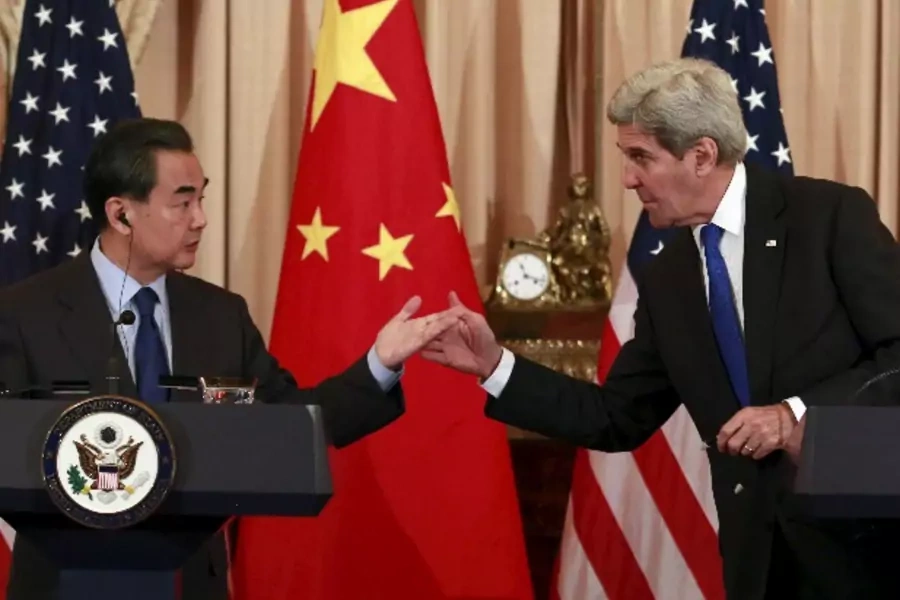A "Gut Check" on U.S.-China Policy

At the end of March, I testified before the U.S.-China Economic and Security Review Commission on the economic aspects of the “rebalance” to Asia. I have testified before the commission several times, know a number of the commission members, and typically enjoy the experience. This time was no different. However, I was struck by the number of “gut check” questions, as one commissioner put it—questions where the answer appears clear, even obvious, but with a bit more pushing becomes less clear and less obvious. Here are some of the “gut check” questions that the commissioners asked that have made me take another look:
More on:
Should we be concerned about the attempted acquisition of Starwood hotels by the Chinese insurance company Anbang, given the opacity of its funding and ties to the Chinese government? (Technically, of course this issue is moot since Anbang withdrew its offer, but the issues surrounding Chinese direct investment in the United States remain.)
The reflexive answer is that we should not treat Chinese companies any differently than those of other countries. Business deals should proceed as long as these companies are acting according to U.S. law and—if required—pass a review of the Committee on Foreign Investment in the United States (CFIUS).
On deeper reflection, however, the answer may well be that Chinese state-owned companies—or even private companies with opaque sources of financing that likely include the Chinese government—may demand an additional layer of scrutiny. When Chinese firms buy U.S. technology companies, for example, should the United States be thinking two or three steps ahead as to the potential security risks—even if the one-off purchase does not appear to pose a problem? Or are there political concerns that need to be considered? As one commissioner noted, with Dalian Wanda’s buyout of AMC theaters, will that movie chain ever show a move about Tibet?
My takeaway is that the CFIUS review may well not be enough. The United States needs to be thinking in a more strategic, integrated fashion about Chinese investment in the United States and the acquisition of U.S. companies as well as what the ramifications might be for U.S. political and security interests. There are some indications that the Chinese government is trying to rein in Chinese overseas M&A for its own domestic economic purposes, and thus a potential investment lull could provide a good time to undertake a review of how we evaluate Chinese investment into the United States.
Does the Trans-Pacific Partnership (TPP) serve U.S. interests?
My reflexive answer—and the general consensus in China/Asia think tank circles—is that the TPP is a no-brainer. Stronger environmental and labor standards, greater intellectual property rights protection, and a raft of tariff reductions all appear to benefit U.S. firms. In addition, for Asia scholars, there is the credibility issue: the TPP is the centerpiece of U.S. economic engagement in the region. Not ratifying the TPP is the equivalent of dealing a death blow to U.S. influence in the region, and, as President Obama stated, permitting China to write the rules of the road. Of course not every U.S. firm will be a winner—trade agreements are all about tradeoffs—but overall, the United States will benefit.
More on:
In my gut, however, I wonder whether we have a complete enough picture of how great the wins and losses for U.S. companies will be. The studies of the TPP that I could find in preparing for my testimony were conflicting, not comprehensive, and in some cases outdated. And while credibility in the region is crucial, it should not override consideration of the greatest good for American firms and workers.
My takeaway is that Congress should commission an independent report on TPP tradeoffs so that the next administration and Congress can make its assessment based on the greatest possible number of facts and least amount of supposition.
What are Chinese intentions?
This issue was actually raised first for the panel before mine that was convened to discuss security issues. The answer was that we can’t know what their intentions are; we need to deal with the facts on the ground.
I think, however, that it is important to try to get at intentions. Take a look at Xi Jinping’s statements on any given issue from the South China Sea to China’s role as an economic norm-setter. They are full of intent. Indeed, there is very little mystery about Xi’s endgame.
Dealing with outcomes or “facts on the ground” lends a sense of objectivity and distance, which analysts generally prize. However, we will never get ahead of the curve if we don’t risk considering what the Chinese leadership is attempting to accomplish overall. We will be caught in a never-ending tactical rather than strategic game. Better to risk being wrong about Chinese intentions than to avoid the issue.
U.S. policy toward China is messy and appears likely only to get messier. Even with its economy slowing, China’s size and ambition make its decisions and actions a potential game changer. No one wants to have one set of rules for how we deal with China and another for how we manage relations with everyone else. And no one wants to be irrationally fearful of China. However, these are not good reasons not to take a step back and acknowledge that the U.S. system may well be inadequate to the challenge at hand and that managing the uncertainty that China presents may necessitate rewriting the rules for everyone. Getting that process started would be a worthwhile effort for the remaining months of the Obama administration. At least that is what my gut is telling me.
 Online Store
Online Store